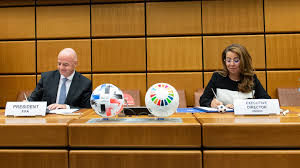By Paul Nicholson
September 16 – FIFA has signed a memorandum of understanding with anti-corruption agency, the United Nations Office on Drugs and Crime (UNODC) “to step up their joint cooperation to address threats posed by crime to sport,” said a FIFA press release.
It seems somewhat incongruous that the organisation, whose president, Gianni Infantino, is under criminal investigation for alleged corruption in his own country, should be attempting to take the moral high ground.
One of Infantino’s first acts when he assumed the FIFA presidency was to remove the independent ethics investigators and judiciary, replacing them with officials who FIFA could appoint themselves and without any form of independent oversight. It is the new ethics functionaries who have repeatedly failed to pursue ethics complaints and violations made against Infantino. Most recently ruling that he could continue in office despite the criminal investigation – the first time any FIFA official has remained in office in Switzerland when facing criminal charges brought by a special prosecutor.
Having signed the MoU, Infantino further sought to build his own corruption credentials (positively) by saying that FIFA would invest in a body dedicated to investigating corruption in sport.
“We at FIFA are ready to invest in it,” Infantino said, saying “maybe the creation of such an agency would help make sport safe in the decades to come.”
Sports corruption was a consistent theme at the Sports Integrity Week of webinars last week, organised by the Sports Integrity Global Alliance (SIGA). FIFA had no representation on just two of the panels in a week of more than 50 separate sports integrity events.
The MoU signed at UNODC’s Vienna-based headquarters by UNODC Executive Director Ghada Waly and Infantino and pledges to consider ways in which football can be used as a vehicle to strengthen youth resilience to crime and substance use through the provision of life skills training.
“Sports support the development of children and youth, and we need sports more than ever in the COVID-19 recovery to make people healthier and happier, and bring jobs back. But in order to harness the power of sports we need to protect sports integrity,” said Waly.
“I believe that FIFA, the international governing body of football, the world’s game, and the United Nations, the world’s organization, make formidable allies, and I am very pleased that UNODC and FIFA have joined forces by signing this Memorandum of Understanding to safeguard football and sporting events from corruption, promote youth crime prevention, and keep children and young athletes safe from violence and exploitation.”
FIFA said key areas of “collaboration included child safeguarding and the protection of vulnerable youth in football, anti-match manipulation and anti-corruption, the legacy of major football competitions, life skills development, anti-discrimination, and social inclusion through football in the context of youth crime prevention.”
FIFA and the UNODC will start an initial consultation process that FIFA says will include “sports organisations, intergovernmental authorities, governments and specialist agencies with the objective of establishing an independent, multi-sports, multi-agency international entity to investigate abuse cases in sports.”
Their vision is for the remit of a new organisation would include:
- the establishment of trusted reporting lines;
- the formation of a global pool of experts, that can be promptly mobilised to provide specialist case management and care support to victims, witnesses and whistleblowers, locally;
- the standardisation of sanctions and disciplinary measures; and
- the establishment of screening processes to ensure that perpetrators cannot move from one region to another, between different sports, nor escape justice.
This all sounds good and for anyone in the sports integrity business, standard high level talk. But isn’t what that is already taking place with other multi-stakeholder initiatives within the sports integrity area and why does FIFA need to reinvent the wheel? Unless of course they need to shape it to their own purpose, arguably the modus operandi of their own Ethics function currently.
But first the Swiss criminal investigation into Infantino should be allowed to rigorously and unencumbered pursue its course. The most concerning allegation being that Infantino – who has a law degree – deliberately interfered with the Swiss justice system and its FIFA investigations in a series of secret meetings with disgraced Swiss attorney general Michael Lauber.
Now FIFA would appear to want to own the integrity process as well.
News that former US Attorney General Loretta Lynch (famous for launching the FIFA indictments in 2015 with Lauber at her side) has joined FIFA’s newly retained US lawyers Paul Weiss as a partner raises uncomfortable questions of integrity and impartiality.
For FIFA, corruption and sports integrity appear to be a negotiable concept.
Contact the writer of this story at paul.nicholson@insideworldfootball.com

